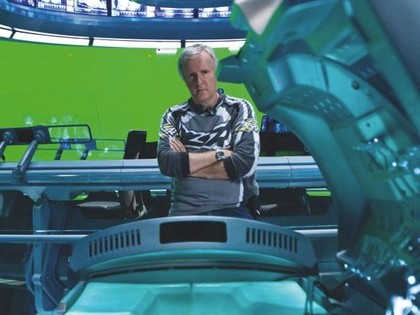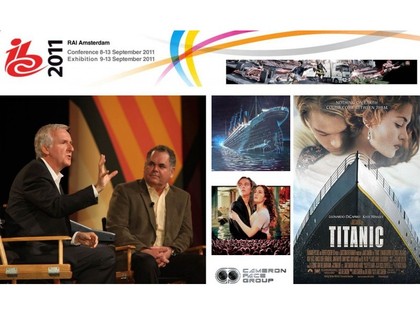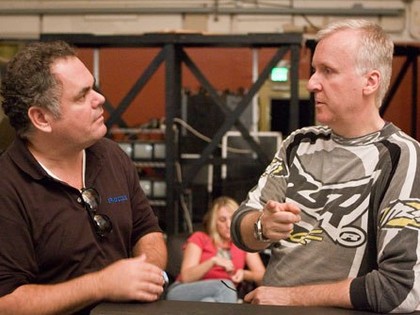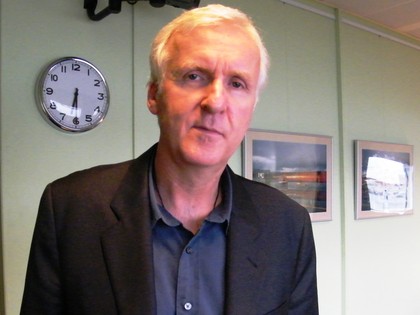James Cameron on 3D: the techradar interview
Talks 3D's future, Avatar 2 and Titanic 3D
One quality improvement for 3D, which Cameron has publicly hailed as the future of the format, is matching the technology with fast frame rate shooting. Although we aren't going to see it used by Cameron until Avatar 2 – which is pencilled in for a 2014 release date – it is a technique that Peter Jackson is using for The Hobbit.

3D WORLD: Cameron behind the scenes of Avatar
"When I went to Show West in 2005 and showed 3D and said this is the future, there was a lot of sniggering and scepticism – even though it turned out to be the case," said Cameron to TechRadar.
"When I showed them high frame rate, however, I did a compelling demonstration, showing the same shot at 24, 48, 60 and so forth and the response was immediate. The exhibitors just got it and understood that this was something they could do quickly, that would be inexpensive.
"It seems to be gathering more momentum than 3D and by the time that I do release the next Avatar in four years it is going to be all over the shop. Something like 50 people would have done it and Peter Jackson looks like the one to break the ice."
3D conversion is "mind numbing"
Although we won't see Avatar 2 for a number of years, Cameron will soon be releasing Titanic 3D, which will be the first time the director has used 2D to 3D conversion – a process that's easy for CG movies like Toy Story but for use on movies with real actors, it is a painstaking process of image manipulation and one Cameron is not entirely enthused about.
Get daily insight, inspiration and deals in your inbox
Sign up for breaking news, reviews, opinion, top tech deals, and more.

TITANIC 3D: A 'mind-numbing process'
"I really don't enjoy the process," he explained.
"While Vince and I sit gleefully watching our 3D images being shot, a conversion is the exact opposite.
"It is a mind numbing process of creating depth subjectively.
"I am five months in so the artists are becoming good and starting to read my mind a little, so it has become easier, but I still sit there with the jog wheel and look through the movie frame by frame and make notes on depth."
"'That should be closer, that should be further back, there's not enough full depth here, there is not enough volume on that shoulder, a little more volume on that urn in the background, see that chair in the background on the left, no the other one on the left, that one needs to come forward another six inches… when the captain stands up we have to do an interlocular dynamic, da da, da da, da da… it's fricking endless!
"It's a mind-numbing process; it's like mowing the lawn with a toenail clipper."

KIDS ARE ALRIGHT: Cameron and Pace are like kids when shooting in 3D
While this doesn't mean we won't see other Cameron classics getting the 3D treatment – "Never say never, but if we can't do it with Titanic and George Lucas can't do it with Star Wars, then there isn't a market" – it does prove that introducing 3D at the beginning of the film-making process is far easier than doing it after the fact.
Cameron was keen to point out, however, just how much time he is investing into Titanic 3D.
"We are spending $18 million on Titanic and giving the project a year," he notes after we ask him why he thinks 2D to 3D conversions have failed before, using Clash of the Titans as an example.
"That was a classic mistake," said Cameron.
"They tried to make 3D a post-production process like sound editing and that doesn't work. The film-maker has to be involved and it takes time and good money to do a proper conversion.
"All of those things work against you in post production, where the film-maker is spread thin with getting the visual effects and getting the sound and music done so can't be looking after the 3D and somebody else is doing it.
"They spend five weeks getting stuff done that should take five months, or eight weeks that should take eight months, they spend 10 million dollars on something that costs twice that."
3D has arrived
It is only when you sit down with Cameron you really begin to realise how deep his fascination with 3D is, and that despite the technology still not being where he wants (something he is realistic about), he still believes that 3D's time is now and the tech has arrived at a point when cinema has reached a pinnacle technology-wise.

FACE TO FACE: TechRadar was granted an extensive interview with Cameron
"We have cracked the frame rate issue and there's not much more to be done. I am going to have to spending my entire day on just creative issues," laughed Cameron.
"But we have sort of done it. We have got colour, we have got widescreen, we've got sound, we've stereophonic sound and stereoscopic projection – we are done! We have covered all of the senses.
"For me now, it is getting good practises for 3D into the home, into the workplace, and into our daily image consumption."
Part of this daily 3D image consumption is weaning consumers off the idea that 3D equals glasses.
"We can't wait for big-screen autostereoscopic displays, because right now the quality on them is too poor.
"But smaller screens that are in the desktop, laptop, tablet size, where it is basically a single user model, you can do those right now. And you are going to see a lot more of those products coming to market over the next year and so.
"Then people will realise that 3D doesn't equal glasses, 3D only equals glasses in certain circumstances.
"Ultimately with tablets and laptops, people can toggle between 2D and 3D, and it will just become part of their diet."
For more information on the productions that are using Cameron | Pace equipment and news on their upcoming projects, head over to www.cameronpace.com.
- 1
- 2
Current page: High frame rates, Avatar 2 and Titanic 3D
Prev Page Walking With Dinosaurs, the BBC and good 3DMarc Chacksfield is the Editor In Chief, Shortlist.com at DC Thomson. He started out life as a movie writer for numerous (now defunct) magazines and soon found himself online - editing a gaggle of gadget sites, including TechRadar, Digital Camera World and Tom's Guide UK. At Shortlist you'll find him mostly writing about movies and tech, so no change there then.
